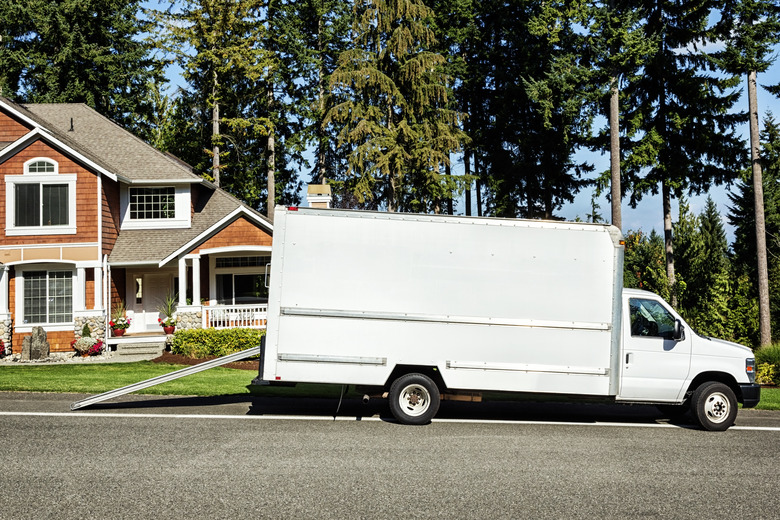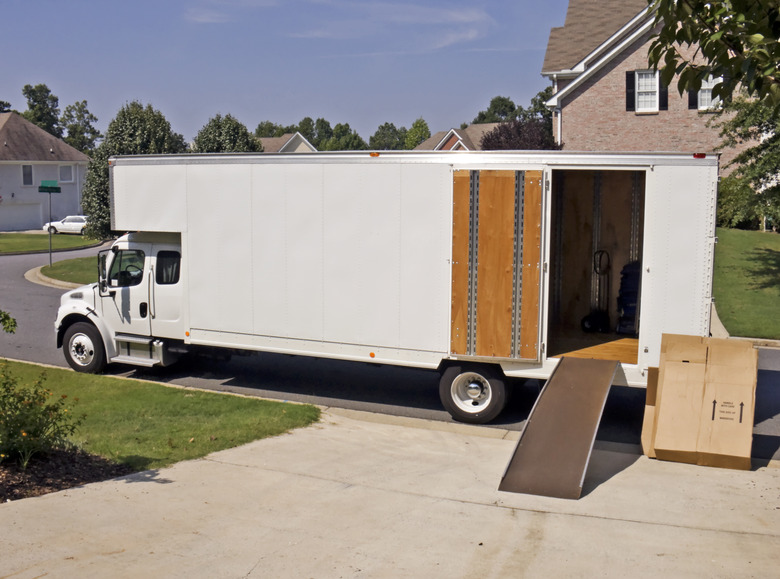What You Need To Know Before You Hire Professional Movers
You scored your dream job, but it will require you to pull up stakes and move to a new city. While you could try to rent a moving truck and attempt a DIY move in order to save money, hiring professional movers is sure to make the process a lot quicker and easier, helping to reduce the hassle of moving, which is stressful enough on its own. While all movers can take your stuff from point A to point B, some may provide additional services as well, including helping you pack and load your items.
Ready to hire a professional moving company? Here's everything you need to know.
How a Mover Can Help
How a Mover Can Help
Movers specialize in helping people move their possessions, but how they do that varies from company to company. At the most basic level, a professional moving company will help homeowners transport their possessions to their new home. Some companies may offer additional services that can even aid those who rent their own moving truck and DIY the rest of the process. These extra services may include:
- Performing an inventory of your items
- Bringing you packing supplies
- Packing your items
- Loading the items into the vehicle
- Unloading your possessions
- Unpacking your items
- Transporting your vehicle
Doing Your Homework
Doing Your Homework
Before getting estimates from movers, you should familiarize yourself with the different types of moving company estimates so you can fairly compare estimates and understand the terms of your contract. Movers offer three different types of estimates: binding, nonbinding, and not-to-exceed estimates.
A binding estimate is one that cannot change, even if the shipment weighs more than what the shipper originally estimated. If items are added to a binding estimate after it is submitted, then the mover may revise the estimate or change it to another type of estimate.
Nonbinding estimates are an approximation of the total cost. The final cost will be estimated after the shipment is weighed. These estimates are often less than a binding estimate, but the final cost could be more than the original estimate. Movers cannot charge more than 110 percent of the estimate amount at the time of delivery, but when the price exceeds this amount, you will be expected to pay the balance within 30 days of delivery.
A not-to-exceed estimate, also called a "guaranteed price" or "price protection" estimate, essentially guarantees that the homeowner will get the lowest price whether it is the original estimate or the cost based on the actual weight. In other words, if a mover underestimates the weight of a shipment, you cannot be made to pay more after the fact like you would with a nonbinding estimate. If the cost based on the actual weight is cheaper than what was estimated, you will pay less than the estimate.
Different Types of Movers
Different Types of Movers
There are many types of moving companies out there, and it's important to find professionals who offer the services you need for your big move. Whether you are doing a long-distance move (defined as a move that requires travel of 100 miles or more or any interstate move) or a local move will dramatically impact the total price of the move. It's important to recognize that local movers are often unwilling or unlicensed to perform long-distance moves, and long-distance movers typically don't want to bother with local moves, so it's important to know which type of movers you need.
Aside from local and long-distance movers, there are some specialty moving services you may want to seek out as well.
White-Glove Movers
Full-service movers, sometimes called white-glove movers, handle every aspect of the moving process for you, including performing an inventory of your possessions, providing packing supplies, packing your items, loading the boxes, moving your stuff to your new home, and unloading the goods from the truck. Some will even do the unpacking for you too.
Because different full-service moving companies offer different services, always carefully review estimates from these companies to ensure you are getting what you want from the company and not paying extra for services you don't need. For example, not all full-service movers will unpack your boxes, and not all companies will provide packaging materials. Also be aware that many of these companies pack and store your belongings for as much as a few weeks before delivering them to your new home, so you should pack important documents, medication, and a few weeks of clothing ahead of time and then keep these items in your possession.
Traditional Moving Companies
Traditional moving companies will help you load boxes you have already packed, drive them to your new home, and unload them at the new address. If you prefer to do the loading yourself on your own time, look into a moving container company. These businesses leave a storage unit on your property that you can pack, and when you're finished, they'll pick up the container and move it to your new home, where you can unload it on your schedule. When you've emptied the storage unit, the movers will take it away.
Moving Labor Company
Alternatively, if you want to drive your own moving truck but can't do all the heavy lifting yourself, you can hire a moving labor company to help you load or unload the truck. On a similar note, if you can't stand packing all your home goods or are worried about getting sufficient protection for your antiques and collectibles, you might want to work with a professional packing service that will properly organize your items and carefully package your breakables. If you find yourself in need of many of these a la carte services, it might be cheaper to hire a full-service moving company, so you might want to get estimates from different service provider types.
Brokers
While not technically a mover, some homeowners prefer to work with a broker rather than dealing directly with movers. Brokers cannot move your belongings themselves and will not assume responsibility for it. Instead, when you work with brokers, they will give you an estimate over the phone or internet and then bid out the job to a moving company for a commission fee. While brokers can help you save money over working directly with a moving company, they are sometimes unable to sell your job, and you may be left without a mover on moving day.
Some brokers also work with unlicensed or unscrupulous movers who will try to charge you more money after your move or fail to compensate you if your property is lost or damaged. When working with brokers, always ask for a list of the companies with whom they work ahead of time and verify that the companies on their list are officially licensed and insured with good customer reviews. The company with whom the broker contracts should also perform a physical survey of your home before officially accepting the job.
Choosing the Right Movers
Choosing the Right Movers
Only hire a mover you can trust or you could lose your money or your belongings (or both). Always do your research before asking for an estimate and get estimates from at least three reliable companies so you can find a good price. Be sure to balance the price with the company's reputation for getting items delivered safely.
Start your search by asking friends, relatives, and acquaintances for referrals. If you can't get enough personal recommendations, check Yelp and Google for companies in your area with good customer reviews.
Look up the Better Business Bureau profile of any companies that seem promising to see if they have any unresolved customer complaints. Also check the website of your state's local licensing agency for local movers or the Federal Motor Carrier Safety Administration (FMCSA) for long-distance movers to ensure the company is fully licensed. The FMCSA also has a complaint registry for movers registered with it, so be sure to review that information as well.
Call companies with whom you may want to work and ask them a few questions before requesting they come to your home to create an estimate. Never trust a long-distance moving company that does not give you a written estimate without first visiting your home in person (or at least doing a virtual tour). Questions to ask include:
- What
type of estimate do you offer? - What
services do you offer? - What type
of liability insurance do you offer and how much does it cost? - Do you have a dispute settlement program?
- How
and when will pickup and delivery occur? - How can I contact you before, during, and after the move?
Once you choose a company, be sure to review the specific details of the estimates so you know what services are included, if any extra fees may apply (parking fees and charges for staircases may be added after the initial estimate), the insurance coverage for your items, and other terms of the contract. Never sign a blank or incomplete estimate or a scammy moving company could change the terms without your knowledge. Never trust a company that only accepts cash or asks for a large down payment. While it's common to ask for a small deposit to save a date, large down payments are a red flag that you are being scammed.
The Cost of Hiring Movers
The Cost of Hiring Movers
How Much Does it Cost to Move?
|
Type of Move |
Average Cost |
|
Local move |
$800 – $2,150 |
|
Long-distance move |
$2,200 – $5,700 |
|
Full-service move |
$2,300 minimum |
It shouldn't be surprising that a local move will cost more than a long-distance move or that full-service movers are more expensive than traditional movers. This means you need to compare moves done on a similar scale to really get an idea of how much they should cost.
Local movers charge based on how many people will be needed to help with the move, how long the drive is, and how many hours the job will take. Some local movers charge a flat fee, but most provide an estimate based on an hourly rate. Many charge a minimum rate for smaller jobs that require minimal labor and time. In some states, including California, local movers must also charge for what's known as double drive time, meaning they double the fees for the time they actually drive to account for the drive back to the headquarters.
For a local move, the average cost is $1,400, with a typical range between $800 and $2,150 for most families. Generally, it will cost around $25 to $50 per hour per mover, with an additional $15 to $25 per hour for the truck and mileage. A studio apartment move will typically take two movers around four hours (a total of $260 to $500), while a move that involves taking everything out of a five-bedroom home will usually take five movers up to 12 hours (coming out to $1,680 to $3,300).
Long-distance moving companies charge based on the total weight of your possessions and how far they need to transport the goods, though they may also add additional fees for things like tolls and lodging for multiday trips. With long-distance moves, the average price range is between $2,200 and $5,700, though for moves over 2,500 miles that involve three bedrooms or more worth of items, the price can easily be upward of $10,000. If your car needs to be moved as well, expect to pay an extra $1,000 per vehicle.
Full-service movers charge a premium rate based on the services they provide. If you provide your own moving materials, for example, the price will be cheaper. On the other hand, if they unpack your items for you, it will be more expensive. They also charge based on the weight of your items and how much stuff needs to be packed as well as how far you need to travel. The prices vary greatly for this level of service, but expect to pay a bare minimum of $2,300.
Whatever type of move you're going through, expect specialty items like pianos or swing sets to cost extra. These specialty services may be between $400 and $2,000 depending on the item's size, weight, and fragility as well as the distance it needs to be moved.
Mover Licensing and Certification
Mover Licensing and Certification
All long-distance movers are required to have a USDOT number from the FMCSA, and brokers who contract with interstate movers are also required to be registered with the agency. Though local movers are not required to have a USDOT number, they should be licensed in your state, though laws will vary from state to state.
Aside from legally required licenses, it can be beneficial to look for movers who have been certified as a ProMover by the American Moving and Storage Association (AMSA). While AMSA is now defunct since it merged with the American Trucking Association (ATA), ATA is still in the process of developing a new ProMover certification, so until the program is open, AMSA certificates are still a legitimate sign of quality.





